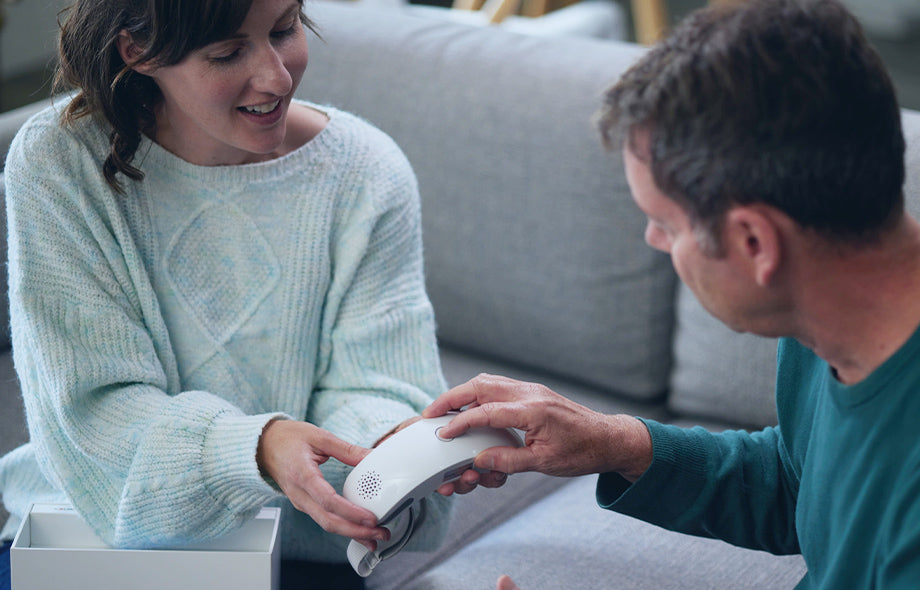How to Support Cognitive Health and Combat Early Signs of Alzheimer’s
Alzheimer's is one of the most challenging and perplexing neurological conditions. Its exact causes are still not fully understood, and even defining its onset can be complicated. While we often associate Alzheimer's with older age, the reality is far more complex. In fact, early-onset Alzheimer's can develop in individuals as young as their 30s or 40s, a fact that remains under-recognized. Despite decades of research into its symptoms and progression, diagnosing Alzheimer's in its earliest stages is still tricky, as there is no definitive test or simple method to detect it. This ambiguity makes it even more vital to understand its early signs and explore effective strategies for supporting cognitive health.
From a Koushicare customer: "I am a 42-year-old who started noticing troubling signs like memory lapses, losing track of my phone, and feeling mentally drained despite getting enough sleep. With a family history of Alzheimer’s, I was genuinely concerned. I decided to try 40Hz light therapy, and after using it for the past 30 days, I've experienced noticeable improvements. My focus has sharpened, my memory has improved, and that constant brain fog has started to lift. It's been a game-changer for me."
Understanding Alzheimer’s: The Early, Middle, and Late Stages
According to John Hopkins Medicine, Alzheimer’s is a progressive neurological disease that affects memory, thinking, and behavior. While it commonly affects people over 65, early-onset Alzheimer’s can occur in individuals as young as their 30s or 40s. Recognizing the symptoms of each stage is vital for managing and slowing the disease's progression.
-
Early Stage (Mild Alzheimer’s)
In the early stage, individuals may experience subtle symptoms that often go unnoticed:
-
Symptoms: Short-term memory loss, difficulty recalling names or recent conversations, and challenges in planning or organizing.
-
Behavioral Changes: Mild confusion, trouble finding the right words, and a tendency to misplace objects.
-
How to Recognize: Forgetting recently learned information or struggling to perform familiar tasks at work or home.
-
Middle Stage (Moderate Alzheimer’s)
This stage can last for several years and often requires increased support:
-
Symptoms: Significant memory loss, confusion about time and place, and difficulty recognizing friends and family.
-
Behavioral Changes: Mood swings, increased frustration, repetitive questioning, and changes in sleep patterns.
-
How to Recognize: Difficulty performing daily activities, such as dressing or preparing meals, and a growing need for assistance.
-
Late Stage (Severe Alzheimer’s)
In the final stage, individuals require round-the-clock care:
-
Symptoms: Loss of the ability to respond to the environment, communicate effectively, and control movement.
-
Behavioral Changes: Difficulty swallowing, increased vulnerability to infections, and significant changes in physical abilities.
-
How to Recognize: Individuals may lose awareness of their surroundings, have trouble recognizing loved ones, and become entirely dependent on caregivers.
Supporting Cognitive Health: Strategies to Slow Cognitive Decline
While there is no cure for Alzheimer’s, several strategies can help support cognitive health and delay its progression, especially if adopted early. Here's how you can protect your brain health:
-
Stay Physically Active
Exercise promotes blood flow to the brain, which helps maintain healthy brain cells and supports the formation of new connections between neurons. Aim for a mix of aerobic exercises, strength training, and balance activities to support overall cognitive health.
-
Maintain a Brain-Healthy Diet
A balanced diet rich in antioxidants, omega-3 fatty acids, vitamins, and minerals can help reduce inflammation and support brain function. Foods like leafy greens, nuts, berries, and fatty fish are known for their cognitive benefits. Avoid excessive sugar and processed foods, which can contribute to cognitive decline.
-
Prioritize Mental Stimulation
Engage in activities that challenge your brain, such as puzzles, reading, learning a new skill, or playing a musical instrument. These mental exercises can help build cognitive reserves and slow down the progression of Alzheimer’s symptoms.
-
Get Quality Sleep
Poor sleep is linked to increased levels of beta-amyloid, a protein that can form harmful plaques in the brains of Alzheimer’s patients. Establish a regular sleep schedule and create a restful environment to ensure 7-9 hours of quality sleep each night.
-
Manage Stress Effectively
Chronic stress can impair brain function and increase the risk of cognitive decline. Techniques like mindfulness, meditation, and yoga can help reduce stress and promote mental clarity.
-
Consider Light Therapy
Emerging research suggests that 40Hz Near-Infrared Light Wave therapy could play a role in supporting cognitive health and reducing early Alzheimer’s symptoms. Light therapy works by stimulating brain activity and enhancing cellular energy production, which may help slow cognitive decline.
40Hz Near-Infrared Light Wave therapy specifically targets the brain’s gamma oscillations, which are linked to memory and learning. By using a device designed to emit this frequency, some individuals have reported improved focus, memory, and mental clarity. This non-invasive approach can be a part of a broader strategy to maintain brain health.
The Potential of 40Hz Light Therapy for Alzheimer’s
Studies have shown that light therapy, particularly at a frequency of 40 Hz, may help combat the buildup of beta-amyloid plaques—one of the hallmark indicators of Alzheimer’s. By utilizing this therapy regularly, individuals might support brain health, potentially slowing down cognitive decline. Light therapy devices designed for home use offer a convenient way to incorporate this promising treatment into a daily routine.
Can 40Hz Light Therapy at Home Support Cognitive Health?
You might wonder if an at-home 40Hz light therapy device can be as effective as treatments provided in a clinic setting. The truth is, many of the professional-grade devices used in clinics rely on the same LED technology found in personal use devices. In fact, the majority of professional equipment employs near-infrared light waves similar to those in high-quality at-home therapy devices.
With at-home therapy, you aren’t sacrificing power or effectiveness—you’re simply gaining convenience. Devices designed for home use, like those using 40Hz Near-Infrared Light Wave technology, are made to provide the same benefits as their professional counterparts. The only difference is that you’re saving on the recurring costs of clinic visits and gaining the flexibility to use the therapy whenever it suits you.
While investing in a personal light therapy device may seem like a commitment, it’s a one-time investment that offers ongoing support for cognitive health. Plus, the benefits of 40Hz light therapy extend beyond Alzheimer's symptoms; it can also help improve:
-
focus
-
enhance memory
-
reduce stress
-
promoting overall mental well-being
Taking Action: Caring for Your Cognitive Health
While there’s no way to predict or prevent Alzheimer’s entirely, supporting your cognitive health is the best defense against early signs of the disease. Regular exercise, a healthy diet, mental stimulation, stress management, and new technologies like 40Hz Near-Infrared Light Wave therapy can all play a role in keeping your brain functioning at its best.
It’s never too early to start taking proactive steps for brain health. Whether you’re concerned about your cognitive function or looking to support a loved one, adopting these strategies can help promote mental clarity and potentially slow the progression of cognitive decline.



Leave a comment
This site is protected by hCaptcha and the hCaptcha Privacy Policy and Terms of Service apply.